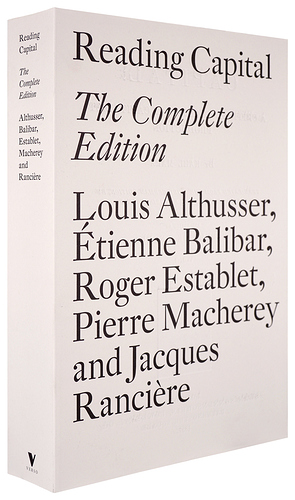In Viewpoint magazine, Nina Power reconsiders theories of reading and social reproduction presented in Reading Capital, a landmark examination of Marx’s Capital by Louis Althusser, Étienne Balibar, Roger Establet, Pierre Macherey, and Jacques Rancière, originally published in French in 1965 and released in a complete English-language edition by Verso in 2016. While Power finds in the book a startling lack of material on the role of women in the reproduction of capital, she suggests that the theory of reading outlined in the book can be a useful took for Marxist-feminist analysis. Read an excerpt from Power’s essay below, or the full text here.
Yet for all the importance of Reading Capital in its attempt to identify the very way in which “incorrect” theories of reading have been unconsciously presupposed in earlier ways of approaching Marx’s Capital, it can certainly be said of the authors of Reading Capital that they too neglect, as Marx himself did, certain crucial concepts that in fact alter completely the way in which we might understand capitalism itself. While we might accept with Althusser that all readings are “guilty,” and not least guilty in the oversights of their own historical contingency, we might say that the time has come for a reading of Reading Capital that explicitly draws out the “absent” question of feminism. This is of course not to suggest that much work hasn’t already been done, both in terms of a feminist reading of Marx and a feminist critique or, more positively, use of the work of the various authors of Reading Capital. But there is much, positively, that can be done with the theory of reading presented in the text that allows for a more interesting double-reading of both Marx and Reading Capital. In this sense, then, the work of Ellen Rooney, which takes a polemical approach to the question of ideology, provides us with a useful model to ultimately move beyond the stasis of guilt. My brief chapter will attempt to adhere to Rooney’s description of “the irreducible difference of view, of terrain, that is reading,” an approach that “discloses double-reading as a hopelessly political and historical process, one that no text can escape, foreclose, or defend itself against.” Rooney’s emphasis on the politics of reading informs here the suggestion that it is possible to read the gaps of Reading Capital as full gaps, rather than empty spaces.
